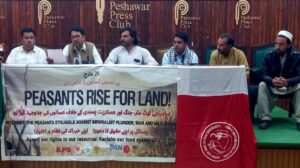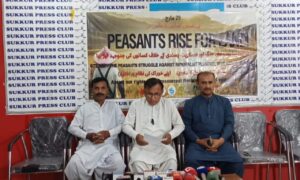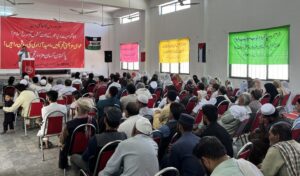پریس ریلیز ، 16 اکتوبر 2025
پاکستان کسان مزدور تحریک (پی کے ایم ٹی) اور روٹس فار ایکوٹی دیگر علاقائی اور عالمی تنظیموں ایشین پیزنٹ کولیشن (اے پی سی) اور پیپلز کولیشن آن فوڈ سورنٹی (پی سی ایف ایس) کے اشتراک سے پچھلے کئی سالوں سے 16 اکتوبر خوراک کے عالمی دن کو ”بھوک کے عالمی دن“ کے طور پر مناتی ہے۔ اس سلسلے میں پی کے ایم ٹی نے سکھر، خیرپور، شکارپور اور ماتلی پریس کلب میں پریس کانفرنسوں کا انعقاد کیا۔ اس کے علاوہ پشاور پریس کلب کے سامنے ہری پور اور پشاور کے کسانوں نے احتجاجی مظاہرہ کیا، جبکہ جام پور میں بھی احتجاج کا اہتمام کیا گیا۔
پاکستان کسان مزدور تحریک کے رہنماؤں نے حکومت پاکستان کی کسان دشمن پالیسیوں اور زرعی خود مختاری پر حملوں کی سخت مذمت کرتے ہوئے کہا کہ اس سال بھی حکومت کی جانب سے گندم کی امدادی قیمت کا اعلان نہ کرنے سے چھوٹے اور بے زمین کسان بدترین معاشی دباؤ کا شکار ہیں۔ پی کے ایم ٹی کے مطابق گندم پاکستان کی غذائی خود مختاری کی علامت ہے مگر حکومت کا کسانوں کے لیے امدادی قیمت طے نہ کرنا دراصل ان کی محنت اور روزگار پر کاری ضرب ہے۔ اس کے نتیجے میں کسان پیداواری لاگت بھی پوری کرنے سے قاصر ہیں جب کہ کھاد، بیج اور زرعی ادویات کی قیمتوں میں ہوش رُبا اضافہ اُن کی مشکلات میں مزید اضافہ کررہا ہے اور زرعی بین الاقوامی کمپنیاں بیش بہا منافع کمارہی ہیں۔



